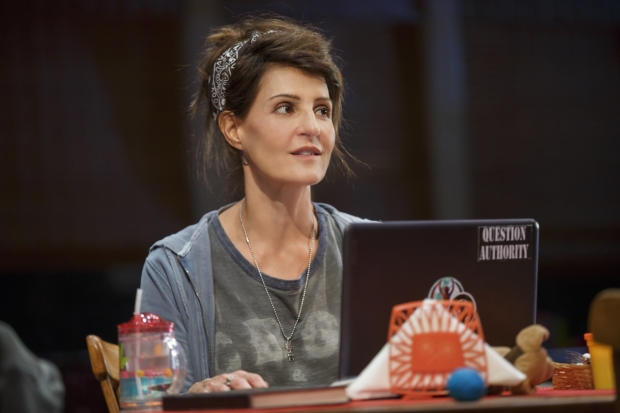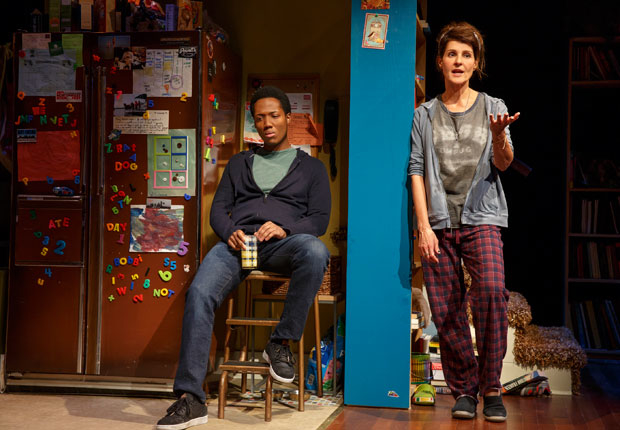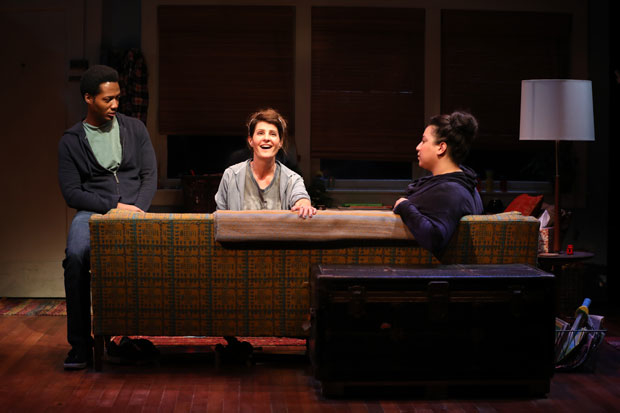Nia Vardalos Finds Joy in Theater's Beautiful Autonomy With Tiny Beautiful Things
When Nia Vardalos says she's "probably one of the nicest people in show business," she does so with such an effortless, measured charm that you believe her. It's not the least bit surprising, then, that when she and Tony-winning director Thomas Kail (Hamilton) approached author Cheryl Strayed about adapting her book Tiny Beautiful Things for the stage, this was the very thing used to reassure the author. "Please feel safe" was the sales pitch for a deal sealed with a hug before work began the same day with nary a lawyer in sight.
That unique arrangement feels entirely fitting to the resulting Tiny Beautiful Things, which is currently enjoying an extended return engagement at the Public Theater's Newman Theater after premiering last fall in the venue's smaller Shiva Theater. The book, a collection of anonymous letters from ordinary people seeking answers to life's relentless barrage of questions in the form of advice from a columnist known only as Sugar (Strayed, writing anonymously), seems a strange choice to adapt as a play. But Vardalos, best known for her work as a screenwriter and film actor (My Big Fat Greek Wedding), has a deep love of the theater and saw the potential and challenge of bringing the piece to the stage as both a writer and actor.
"I love it. I love the discipline of doing eight shows a week," said Vardalos of her time back onstage. "Every aspect of theater, especially working at the Public, reminds me why I love being an actor. The closeness of the audience — I can hear them breathing, gasping, crying, laughing. It's the best."

(© Joan Marcus)
This interview has been condensed and edited for clarity.
What about the book inspired you to adapt it for the stage?
The audacity. There was something about the letter writers and then, of course, the language that Cheryl Strayed uses, the unending empathy, the bravery of the letter writers, and the illuminative way that Cheryl writes. As opposed to telling people what to do, she mostly says, "Hey, this happened to me. Is there something in here that you might be able to use?", and I like that. I like that it wasn't delicate. I like that her advice is bold, and again, she's audacious in saying, "Hey, don't cheat on your wife." You know? There's something so great about that.
Was it hard deciding what to include and what to cut?
Yes. It was very hard to decide what went in, like choosing which cousins you were going to keep in your family. It was horrible. As someone with 27 first cousins, there's no way I could distill it down to the goal of approximately 15 pieces. I started to cannibalize and go within one piece and pull and put into another. I had to leave a lot of relatives behind. The amazing thing about Cheryl is that she understood why. She was invited into the process, so she knew that she could speak up . Very often, she would ask why something was not in or was in, and I find that when I have to explain something, it brings clarity. So I loved it. I never felt challenged in a negative way by her. I always felt that we all had the same goal: Let's make the best piece of theater that we can.
How has playing Sugar affected you as an actor?
She's transparent in a way that is aspirational for me. I'm trying to have better friendships, more honest relationships because of playing Sugar. I'm not really like that in real life. I'm not a person that feels that I'm here to put a salve on your wound, but there's something about playing this character that has made me feel more open and like I want to be more present and listen more.

(© Joan Marcus)
Revisiting the play, did you find anything that surprised you?
I think it's the words and the language that surprises me. The piece surprises me. When I'm writing, I usually forget I’m going to play it. Like in Connie and Carla (Vardalos's 2004 drag-queen-infused farce movie), I remember when the gun went off, I thought, "Oh, that's violent," and then I thought, "Well, you wrote it, you idiot." And the same thing is happening here when I'm doing the piece called "Baby Bird," where Sugar is talking about the incestuous sexual abuse that happened to her. When I'm doing it, it is repulsive, and yet I put it in. So there's something — I think sometimes my subconscious is much more courageous than the actual me.
You've written extensively for feature films and television. Is this return to playwriting something we can expect more of from you?
Yes, I've loved my time in New York so much, and I've gotten to see so many other pieces of theater, and it occurred to me that there is a beautiful autonomy in theater that I haven't really experienced except for my first movie and my book. Other than that, you get noted to death, and I love input, but there's such reverence for the playwright. So I've started to take notes. I do have my eye on creating some more plays. It's been such a not-tiny beautiful experience.

(© Joan Marcus)










